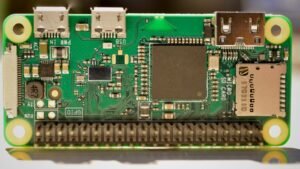Artificial Intelligence Home Automation
Advancements in artificial intelligence (AI) have revolutionized the way we live, and home automation is no exception. AI-powered smart home devices have made it possible to control various aspects of our homes with just a few taps or voice commands. From lighting and temperature control to security systems and entertainment centers, AI home automation can enhance our quality of life and provide convenience like never before.
Key Takeaways
- Artificial intelligence fuels the automation of various home devices and systems.
- AI home automation offers convenience, energy efficiency, and enhanced security.
- Smart home devices powered by AI learn from user behavior and adapt accordingly.
With AI-driven home automation, homeowners can take advantage of a wide range of benefits. A key advantage is the convenience it offers. Smart home devices can be controlled remotely from a smartphone or through voice assistants, allowing homeowners to manage different aspects of their homes even when they are away. These devices can automate repetitive tasks and simplify daily routines, making life more efficient and enjoyable.
Energy efficiency is another crucial factor in AI home automation. By intelligently controlling lighting, heating, and cooling systems, AI-powered devices can optimize energy consumption and reduce utility bills. For example, smart thermostats can analyze occupants’ behavior, outdoor temperature, and energy tariff plans to adjust temperatures and save energy. *The ability of AI algorithms to learn and adapt to user preferences over time enables personalized energy management solutions for homeowners.*
Security is always a top priority for homeowners, and AI home automation provides advanced security features. AI-powered surveillance cameras can intelligently detect and analyze movements, sending real-time alerts to homeowners’ smartphones. Smart locks can be controlled remotely and grant access to visitors using temporary digital keys. By integrating with AI, security systems become proactive and capable of identifying potential threats, enhancing the safety of our homes. *AI-driven facial recognition technology ensures a higher level of security as it accurately identifies authorized individuals.*
| Automation Category | Device Examples |
|---|---|
| Lighting | Smart bulbs, dimmers, color-changing lights |
| Temperature Control | Smart thermostats, climate sensors |
| Security | Surveillance cameras, smart locks, motion sensors |
AI home automation is not limited to individual devices but also extends to the integration of various systems within a smart home ecosystem. By leveraging interconnected devices and data, AI algorithms can create synergy in automating and optimizing home environments. For example, an AI-powered smart home system can use sensors to detect occupancy and automatically adjust lighting, temperature, and security settings accordingly. *The ability of AI to connect and orchestrate multiple devices allows for streamlined control and a cohesive and intelligently managed smart home experience.*
To better understand the impact of AI home automation, here are three tables showcasing interesting data points:
| Benefit | Statistics |
|---|---|
| Energy savings from smart thermostats | On average, households can save up to 10-15% on heating and cooling costs. |
| Time saved through home automation | Studies suggest that individuals save around 30 minutes per day through automation, amounting to approximately 183 hours per year. |
| Impact of facial recognition technology in home security | Homes equipped with facial recognition technology experience a 30% decrease in burglary rates. |
AI home automation is continuously evolving, with new technologies and devices being introduced regularly. As AI algorithms improve, the capabilities of these smart devices will only become more impressive. Whether it’s managing your home’s energy consumption or enhancing security measures, AI home automation provides a seamless and intelligent solution to simplify our lives and create a more efficient and secure living environment.
| AI Home Automation Aspect | Benefits |
|---|---|
| Convenience | – Remote control of devices – Simplified daily routines |
| Energy Efficiency | – Optimized energy consumption – Personalized energy management |
| Security | – Real-time alerts and monitoring – Enhanced safety features |
Conclusion
Artificial intelligence home automation has revolutionized the way we interact with our homes. With its ability to learn and adapt to our preferences, AI-powered devices offer convenience, energy efficiency, and enhanced security. As AI continues to advance, so too will the capabilities and benefits of home automation. Embracing AI in our homes can truly transform our living environments into intelligent, efficient, and secure spaces.

Common Misconceptions
Misconception 1: Artificial intelligence home automation is expensive
Contrary to popular belief, artificial intelligence home automation is no longer reserved for the wealthy or tech-savvy individuals. There are now affordable options available in the market that allow anyone to incorporate AI into their homes.
- There are entry-level AI home automation devices that are cost-effective.
- AI home automation can actually help save money in the long run by optimizing energy usage.
- An initial investment in AI home automation can lead to increased property value.
Misconception 2: AI home automation is complicated to set up and use
While the concept of artificial intelligence may sound complex, modern AI home automation systems are designed to be user-friendly and easy to set up. Most systems come with detailed instructions and intuitive interfaces that simplify the setup process.
- AI home automation companies provide comprehensive customer support to assist with setup and troubleshooting.
- Many AI home automation systems can be controlled through user-friendly mobile applications.
- Training the AI to understand your preferences can be as simple as providing feedback and adjusting settings over time.
Misconception 3: AI home automation will replace human interaction
One common fear is that AI home automation will lead to a lack of human interaction and a disconnect from the real world. However, this is not the case. AI software is designed to enhance, not replace, human interaction and can actually facilitate more meaningful connections.
- AI home automation can free up time for more quality interactions with family and friends.
- Some AI systems can learn your habits and preferences, making interactions more personalized and tailored to your needs.
- AI can act as a virtual assistant, providing helpful information and recommendations to enhance social interactions.
Misconception 4: AI home automation is a privacy and security risk
Privacy and security concerns are valid when it comes to any technology, but AI home automation can be implemented with robust security measures in place. It is important to choose reputable brands and follow best practices to protect your privacy and mitigate risks.
- AI home automation systems can utilize encryption and authentication protocols to safeguard your data.
- Regular software updates can address security vulnerabilities and ensure the system remains secure.
- Some AI home automation devices provide features to give users control over their data privacy, such as opt-out options.
Misconception 5: AI home automation is only for the tech-savvy
Another common misconception is that AI home automation is only suitable for technologically proficient individuals. However, many AI systems are designed with user-friendliness in mind, making them accessible even to those with limited technical knowledge.
- AI home automation companies provide resources and tutorials for users to understand and make the most of their systems.
- The interfaces of AI home automation systems are designed to be intuitive and user-friendly.
- AI home automation devices can be customized and adjusted to suit individual preferences and comfort levels with technology.

The Rise of Artificial Intelligence in Home Automation
With the advancements in artificial intelligence (AI), the era of smart homes has arrived. AI-powered home automation systems are revolutionizing the way we interact with our living spaces, offering convenience, efficiency, and control like never before. This article explores 10 intriguing aspects of AI home automation, shedding light on the amazing possibilities that lie ahead.
1. Connect and Control
Stay in charge of your home even when you’re away. AI home automation systems allow you to remotely connect and control various devices such as lights, thermostats, security cameras, and door locks. With just a few taps on your smartphone, you can adjust settings and monitor your home’s environment from anywhere in the world.
2. Energy Efficiency
Save energy and reduce utility costs with AI-powered smart home technology. By monitoring your usage patterns and habits, these systems optimize energy consumption, automatically adjusting light levels, temperature settings, and powering off devices when not in use. Experience eco-friendly living without sacrificing comfort.
3. Enhanced Security
Protect your home and loved ones with AI-driven security features. Smart cameras equipped with facial recognition technology detect and alert you of any suspicious activities. Combined with advanced sensors and automated door locks, these systems provide an extra layer of security, ensuring peace of mind.
4. Personalized Environments
Create a truly personalized living space with AI home automation. These systems learn your preferences and adapt accordingly, providing customized lighting, temperature, and music preferences for every room. Experience the luxury of tailored comfort and ambiance, effortlessly.
5. Voice-Activated Assistants
Interact with your home using voice commands through AI-powered virtual assistants like Siri, Alexa, or Google Assistant. From controlling devices to answering questions and playing music, these assistants understand and execute your commands, making your life easier and more connected.
6. Health Monitoring
Track and improve your health with AI-enabled home automation systems. Sensors integrated into your living space monitor aspects like air quality, humidity levels, and even sleep patterns. Receive real-time insights and take necessary actions to elevate your well-being and create a healthier home environment.
7. Entertainment Galore
Immerse yourself in a world of entertainment with AI home automation. Integrated systems seamlessly connect your smart TV, speakers, and gaming consoles, providing a unified experience. Create the perfect movie night or host a lively party with just a voice command.
8. Advanced Appliances
Experience the next level of convenience with AI-powered household appliances. From intelligent refrigerators that monitor food inventory and create shopping lists to self-cleaning ovens and robotic vacuum cleaners, these devices streamline daily chores, giving you more time for what matters.
9. Energy Production
Harness the power of renewable energy with AI home automation systems. Monitor and optimize the usage of solar panels, wind turbines, or geothermal systems to maximize energy production. Contribute to a sustainable future while enjoying the benefits of reduced electricity bills.
10. Future Innovations
The possibilities of AI home automation are boundless. As technology continues to advance, we can expect even more exciting innovations. From predictive maintenance that alerts you before systems fail to AI-infused robotic assistants, the future of home automation holds endless potential.
As we witness the remarkable rise of AI in home automation, our living spaces are being transformed into smart ecosystems. With improved convenience, energy efficiency, security, and personalization, these systems enhance our daily lives. Embracing these technologies ensures a more connected and smarter tomorrow.
Frequently Asked Questions
Artificial Intelligence Home Automation
What is artificial intelligence (AI) home automation?
What are the main benefits of AI home automation?
How does AI home automation enhance convenience?
Can AI home automation improve energy efficiency?
How does AI contribute to enhanced security in home automation?
What devices can be integrated into AI home automation?
Are there any privacy concerns with AI home automation?
Can AI home automation be integrated with existing home systems?
Do AI home automation systems learn and adapt over time?
What are the limitations of AI home automation?





